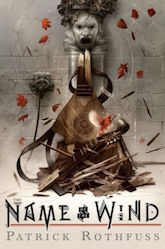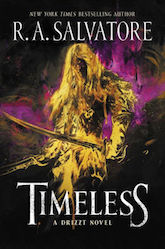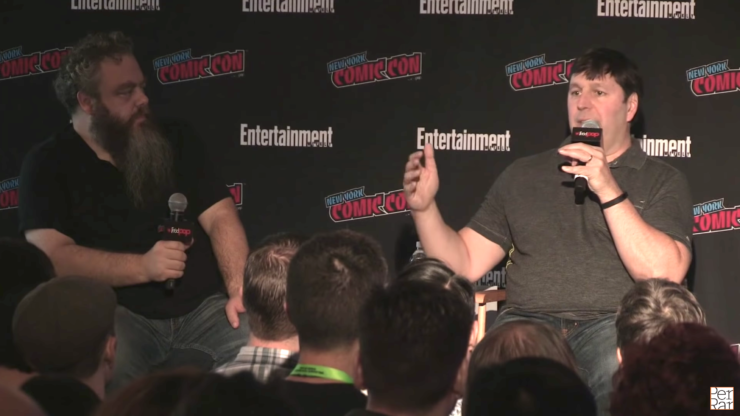Is it anachronistic language? Deadly logic rabbitholes? Or knowing the parameters of an epic fantasy society and then in comes a deus ex machina to completely upend the laws of the world? Patrick Rothfuss (author of The Kingkiller Chronicle) and R.A. Salvatore (who has returned to the Forgotten Realms with a new Drizzt Do’Urden trilogy) sat down with NPR Books’ Petra Mayer at NYCC to talk about what draws them in to epic worlds as readers, and what they endeavor to avoid as writers so as to keep readers engaged in their respective sagas.
You can watch the entire panel below, but here are some highlights:
Buy the Book


The Name of the Wind
Sometimes the most rewarding worldbuilding isn’t the expansive stuff, but the granular details that move the plot farther than an epic prophecy. For Rothfuss, it was the realization that if the University were to conduct interviews with all 1,000 of its students at the start and end of each term, they couldn’t be 10 minutes, as originally intended (because that would take a month or more), and logically could only be three minutes:
You can’t have good interviews in three minutes, and that’s the whole point. The system is broken because they’ve painted themselves into a corner, and it’s just like… Anyone who’s been to college has experienced the weird, anachronistic things that made plenty of sense a hundred years ago and they’re still doing, just ’cause they can’t force themselves to stop. And so I built that into the world, and all of the fun little permutations of that—I picked a few to show [that] boy, this place is kind of a hot mess, just like our world. And then some tension also gets created, because the students know that you’re going to get asked four questions, and if you fuck up one of them, you’ve really ruined your next semester. Doing that granular worldbuilding gave me the opportunity to bring tension into the world that was generated by something other than a monster or a character conflict.
Buy the Book


Timeless
Salvatore has special experience writing in a shared universe among a dozen or more other authors, each carving out their own space in the Forgotten Realms universe—literally, as he explains how Icewind Dale came to exist on a typo in the map. (Salvatore is a hoot, with one choice quote from this panel being “I did a prequel before George Lucas did; I just want to go on record saying that.”) More on the joys of writing in a shared universe:
What drew me there, and kept me there, in the early days was that the whole point of the Realms was, you make your own characters, you make your own stories, you make your own place to put ’em, and then they’re yours. The thing I love about the Forgotten Realms is that ten, fifteen different authors can be writing books set in different parts of the world, and it just makes the world bigger; you didn’t have to tie everything together with these strange coincidences, these teleportation gates so it was the same character or whatever. It just made the world bigger and bigger and bigger and bigger. It’s what makes the world work so well.
Watch the entire panel (thanks to Penguin Random House for the video!) below:










